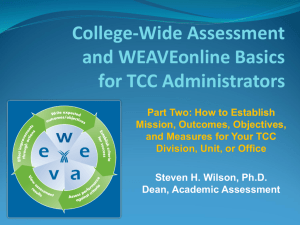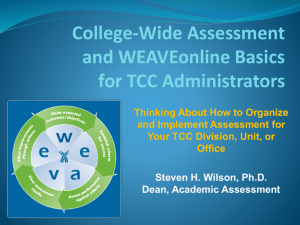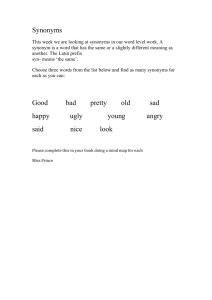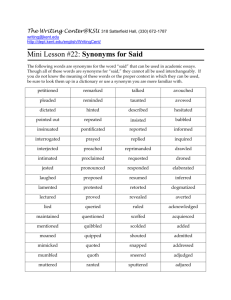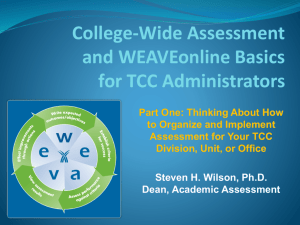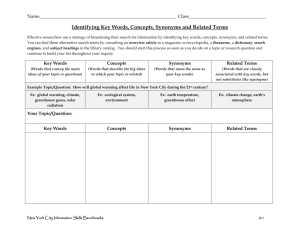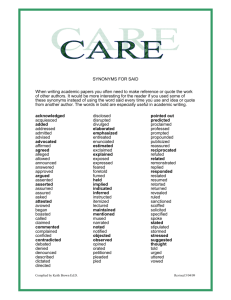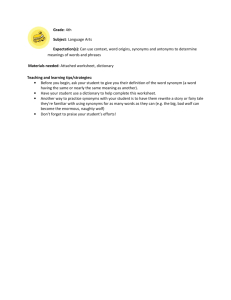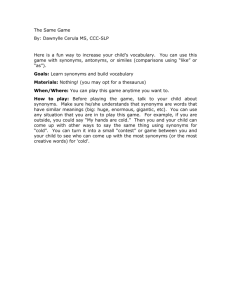Academic Unit Assessment Primer Part 2
advertisement
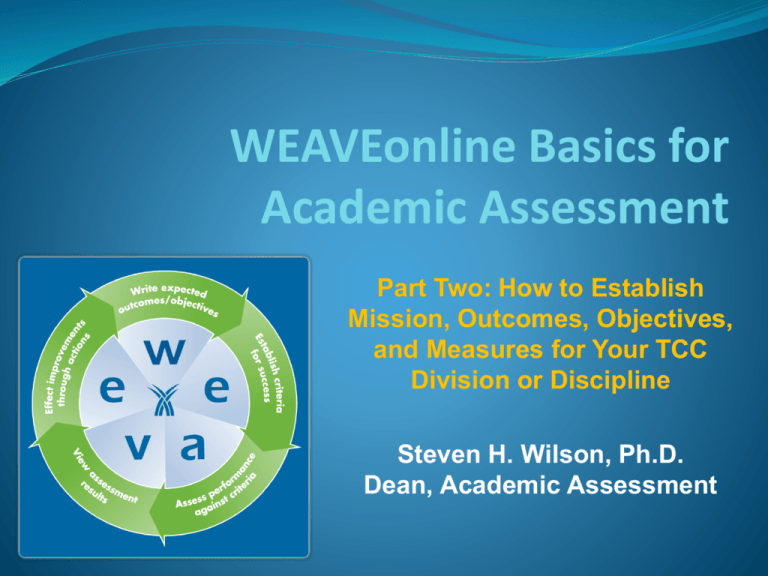
WEAVEonline Basics for Academic Assessment Part Two: How to Establish Mission, Outcomes, Objectives, and Measures for Your TCC Division or Discipline Steven H. Wilson, Ph.D. Dean, Academic Assessment Objectives Learn how to enter, review, edit, and use goals, outcomes, measures, and results Assessment Tools & Tabs Mission Term Synonyms WEAVE definition Mission Purpose Vision Highest aims, intentions, and activities of the entity. An academic program mission/purpose statement should identify what the program will help students and others learn and do within a particular context and state how the program contributes to its wider communities. An administrative unit mission/purpose statement should focus on the reason the unit exists within the institution, the people it serves, and the value its work brings to the institution. A mission/purpose statement should be specific, identifying the important things a unit or program does that separates it from others. Mission / Purpose1 Mission / Purpose2 Mission / Purpose3 Mission / Purpose4 Goals vs. Outcomes/Objectives Goals Outcomes/Objectives General intent Specific intent Long term Short term Can’t be measured as precisely Measurable Where we want to be Steps to get to goal Example: Students will learn conversational Spanish. Example: Students will use 50 vocabulary words in conversation with another student. Goals and Outcomes Term Synonyms WEAVE definition Goals Objectives Outcomes Initiatives Priorities Broad statement about desired ends; what you aim to achieve. More the destination than the path. Outcomes/ Objectives Goals Active-verb description of a desired end result related to the entity mission – can be assessed. Student Learning Outcomes are the knowledge, skills, attitudes, and habits of mind that students take with them from a learning experience. Program Outcomes are not directly related to what students learn or can demonstrate. Outcomes/Objectives Worksheet Assessment Worksheet Academic Division: Contact person: Discipline or Program: Email address: Assessment cycle/year: Mission/Purpose Mission/Purpose: highest aims, intentions, and objectives. [Course, Discipline, or Program] Goals: Goal: broad statement(s) about desired ends. Goal 1. Goal 2. Goal 3. Assessment Summary Student Learning Outcomes Student Learning Outcome: measurable active-verb description of a desired result related to goal(s). Measure(s) Measure: method to gauge achievement of expected outcome. Achievement Targets Achievement Target: faculty-set level for satisfactory performance on a Measure-Outcome combination. Findings Findings: assessment results for comparison of actual vs. expected achievement level. Plus: # of students assessed. Action Plans Action Plan: specific activity designed to help accomplish intended outcomes in future. 1. 2. 3. 4. 5. Questions [Longer-term needs or objectives developed by faculty/discipline/division] Ex. Based on your findings and action plans, what primary changes will you make for student learning? Program outcomes? Changes to the assessment process? Annual Report Items [developed by Assessment Office] Ex. Contributions to other initiatives, Executive Summary, Annual Highlights, Teaching and Research Activities, etc. Administrative Unit vs. Academic Program Outcomes/Objectives1 Outcomes/Objectives2 Outcomes/Objectives3 Outcomes/Objectives4 Measures, Targets, and Findings, i.e., What data you are looking for, How you will weigh it Measures, Targets, Findings Term Synonyms WEAVE definition Measures Metrics Assessments Instruments Sources of evidence Indicators Tools Method to gauge achievement of expected results. Measures are related to Outcomes/Objectives, and split into categories – Direct and Indirect, and Administrative and Academic. Achievement Levels of success Targets Benchmarks Overall level for satisfactory performance on a Measure-Outcome/ Objective combination. Findings Assessment results for comparison of actual vs. expected achievement level. Results Data Outcomes Measures & Findings1 Measures & Findings2 Types of Evidence Direct Tangible, visible, selfexplanatory, compelling Skeptics usually accept Scores and pass rates on licensure / certification exams Portfolios of student work Capstone experiences Indirect Proxy signs, indicators, less convincing Grades Student self-ratings Student / alumni satisfaction with learning Honors, awards, and scholarships Sources of Evidence Measures & Findings3 Measures & Findings4 Measures & Findings5 Measures & Findings6 Measures & Findings7 Measures & Findings8 Measures & Findings9 Examples of how Goals, Outcomes, etc., can be useful for an Administrative Unit Associations, i.e., Accrediting and Certification Standards, Regulations, and the TCC Strategic Plan Associations Term Synonyms WEAVE definition General Education Core Curriculum Selected General Education / Core Curriculum associations. Institutional Priorities Vision Items of urgency or importance to the institution. Standards Accreditation, regional or discipline-specific Acknowledged set of requirements fostering excellence. Strategic Plans Alignment Planning A long-term, practical, action-oriented document resulting from strategic planning. Examples of Associations already available for TCC, and how they appear and are used in the goals & outcomes view Document Repository for Storage, Support, and Reference Document Repository1 Document Repository2 Document Repository3 Questions? Contact: Steven H. Wilson, Ph.D. Dean, Academic Assessment steven.wilson@tulsacc.edu x7959
